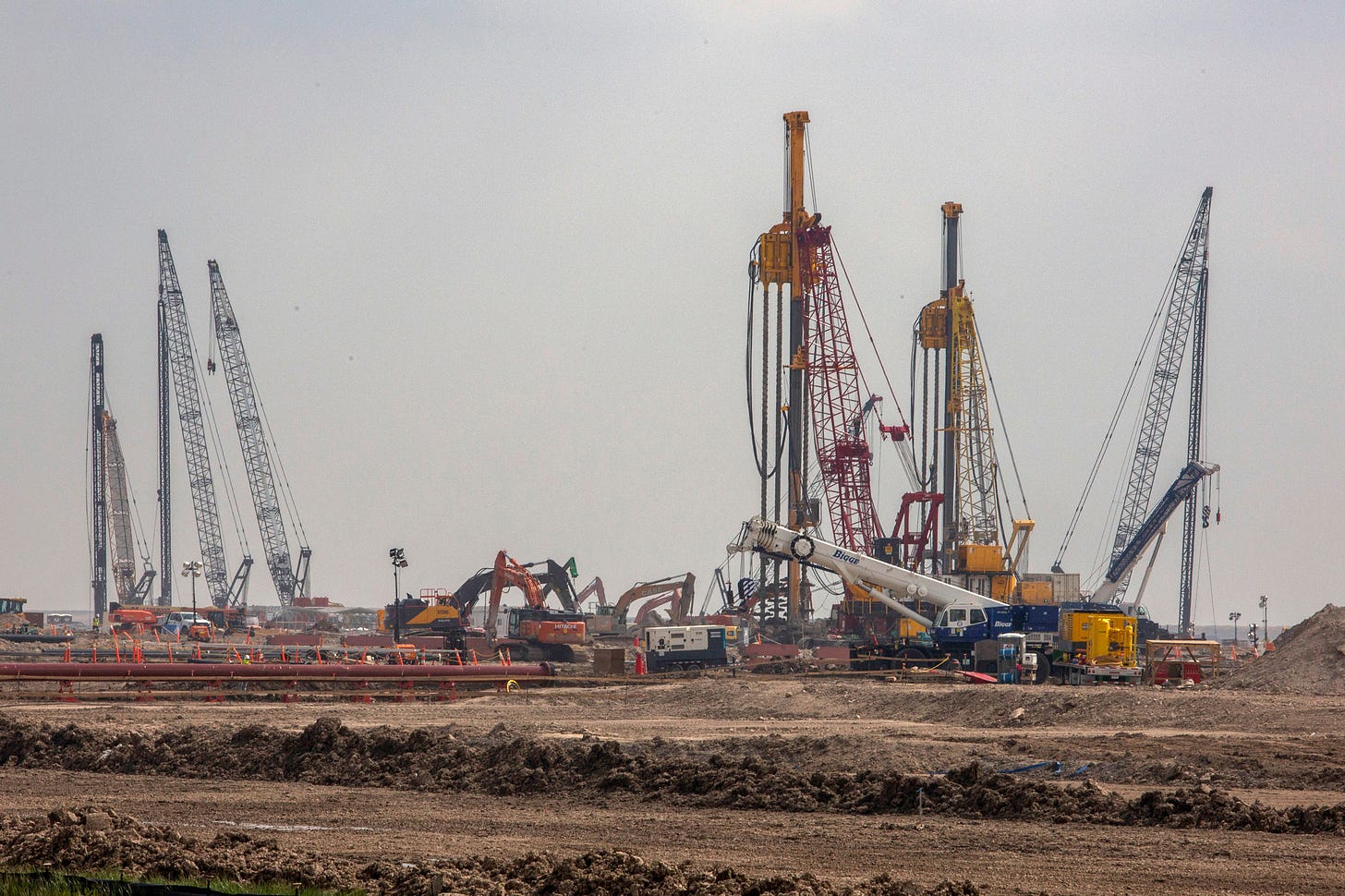Federal Appeals Court Reverses Approval of Massive LNG Export Plants in South Texas The Washington D.C. court ruled that the Federal Energy Regulatory Commission failed to adequately assess the plan…
… the plants’ environmental justice, climate and air pollution impacts. By Dylan Baddour, Inside Climate News and Berenice Garcia, The Texas Tribune
Federal Appeals Court Reverses Approval of Massive LNG Export Plants in South Texas
The Washington D.C. court ruled that the Federal Energy Regulatory Commission failed to adequately assess the plants’ environmental justice, climate and air pollution impacts.
By Dylan Baddour, Inside Climate News and Berenice Garcia, The Texas Tribune
August 9, 2024
For the second time, a federal court struck down a regulatory agency’s authorization of two controversial, multi-billion-dollar gas export projects in far South Texas, one of which is already under construction.
In an Aug. 6 opinion, the U.S. Court of Appeals for the Washington, D.C. Circuit cited “the nature and severity of the flaws” in reviews by the Federal Energy Regulatory Commission of the two proposed gas liquefaction and export complexes, Rio Grande LNG and Texas LNG, along with the associated Rio Bravo Pipeline.
“Although we do not take this step lightly, the circumstances here require it,” the ruling said. “We appreciate the significant disruption vacatur may cause the projects. But that does not outweigh the seriousness of the Commission’s procedural defects.”
The court wrote that FERC failed in its analyses of environmental justice and climate impacts, air pollution modeling and procedural obligations. FERC and the developers now have 45 days to seek a re-hearing.
Explore the latest news about what’s at stake for the climate during this election season.
The two complexes in question plan to pipe in Texas shale gas, condense it and load millions of tons per year onto tanker ships for sale overseas as liquified natural gas, or LNG. Each complex costs billions of dollars, spans hundreds of acres and makes up part of an ongoing boom in gas export projects along the Gulf Coast of Texas and Louisiana.
Rio Grande LNG parent company NextDecade said in a statement it was “disappointed in the Court’s decision and disagrees with its conclusions.”
The company added that construction continues on the first three liquefaction trains and related infrastructure at Rio Grande LNG near Brownsville and it will examine what impact the court’s order will have on future plans for added infrastructure.
The company announced last July it had secured investor funding to begin construction on its 750-acre, $18 billion facility.
A spokesperson for Texas LNG, a smaller, adjacent project on the Brownsville Ship Channel that is yet to secure sufficient funding, said the ruling was a procedural decision to correct a technical deficiency, which they were still studying.
“We have full confidence FERC will address this matter judiciously and efficiently and look forward to working with them on this important issue,” the spokesperson said in a statement.
Three small surrounding cities and the local water district have passed resolutions opposing the projects, situated between national wildlife refuges and atop wetlands.
“Port Isabel and the other communities of the Laguna Madre area are located in one of the most unique, pristine and scenic ecosystems in the world,” said a 2023 resolution by the City of Port Isabel, a party in the lawsuit against FERC. “The proposed project area is located in a delicate and partially undisturbed salt flat.”
The Carrizo/Comecrudo Tribe of Texas, also a party in the lawsuit, has led a yearslong campaign against the destruction of archaeological sites on land that it considers sacred.
“The issue is what they’re doing to continually try to decimate who we are as a people,” said Juan Mancias, chairman of the tribe.
Mancias said Tuesday’s ruling made him proud to be Carrizo/Comecrudo and felt it gave the tribe a say in what happened to the land.
“I’m glad they made the decision that they made, because that decision says a lot about what is lacking in this process of permitting,” he said.

But the projects have unanimous support from the Cameron County commissioners, based in nearby Brownsville, and from most local politicians. Neither Cameron County Judge Eddie Treviño Jr. nor any of the four county commissioners responded to requests for comment.
A FERC spokesperson said the agency does not comment on court issues.
“FERC is a regulator that historically has relied upon industry assurances when making its decisions,” said Tyson Slocum, energy program director at Public Citizen in Washington. “Unfortunately, industry often is wrong, and frequently minimizes potential hazards and risks posed to the community.”
Todd Staples, president of the Texas Oil and Gas Association, said, “Delaying approvals and treating natural gas as a liability rather than an asset squanders our nation’s global energy leadership and forces our allies to look to other nations—some of which are hostile to America—to meet their energy needs.”
Years of Litigation
Tuesday’s ruling was the second time the court struck down FERC’s authorization of these projects in response to petitions from local groups supported by nonprofit environmental lawyers at the Sierra Club.
The first time, in August 2021, the court ruled FERC failed to assess impacts of the projects’ enormous greenhouse gas emissions and had picked an arbitrary two-mile radius within which to conduct its environmental justice analysis. The court also said the projects modeled their air pollution using data from a faraway air monitor in Brownsville instead of the closer Isla Blanca monitor, and asked the commission to reconsider its finding that the projects were in the public interest.






Texas -- Time for Secession? What happened to delegated powers only as dictated by the sovereign states and the ridiculous hijacking of jurisdictional matters pertaining to essential needs and the economic health and well-being of not only those who are directly involved, but those benefiting indirectly from the commerce and trade? Sounds like the "government"has long deserted its charter and has been steered to support globalist agendas and policies at our expense.